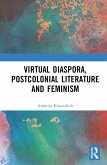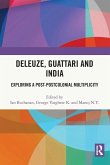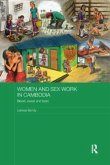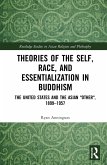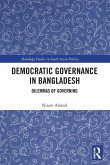This book analyses the resolution of the psychic problem of diasporic existence from a postcolonial feminist perspective, by inscribing and defining the meaning of "virtual diaspora" through the lens of the East/India and the West. It explores the situation that arises when one leaves one's country and becomes an emigrant/immigrant, which often causes pain both in the departure from one's motherland and in the adaptation to a new environment.
The book employs the theory of Deleuze and Guattari and explores the interstices of real and virtual diaspora and the aftermath of diaspora as a mental journey. Adding a new interpretation of transcendence, taken from the Indian perspective, the book examines the Deleuze's theory of immanence and transcendence and the two major concepts of "becoming" and "real/virtual." The book also examines the works of Helene Cixous, J.M. Coetzee, Jhumpa Lahiri, Kunal Basu, and Tagore in light of the concept of virtual diaspora and from a postcolonial feminist angle. It does so by raising the following questions: When one has emigrated to a different country, can one conceive of that existence as real or virtual or both? Do emigrants or diasporic individuals live a life of both real and virtual diaspora? This comes from the idea that both real and virtual diaspora, under different paradigms, may be related to the power struggle and master-slave dialectic that affects all of humanity.
A valuable addition to the study of postcolonial literature, the book will also be of interest to researchers in the fields of diaspora studies, postcolonial feminist theory, postcolonial literature, feminist philosophy, interdisciplinary studies, and Asian Studies, in particular South Asian Studies.
The book employs the theory of Deleuze and Guattari and explores the interstices of real and virtual diaspora and the aftermath of diaspora as a mental journey. Adding a new interpretation of transcendence, taken from the Indian perspective, the book examines the Deleuze's theory of immanence and transcendence and the two major concepts of "becoming" and "real/virtual." The book also examines the works of Helene Cixous, J.M. Coetzee, Jhumpa Lahiri, Kunal Basu, and Tagore in light of the concept of virtual diaspora and from a postcolonial feminist angle. It does so by raising the following questions: When one has emigrated to a different country, can one conceive of that existence as real or virtual or both? Do emigrants or diasporic individuals live a life of both real and virtual diaspora? This comes from the idea that both real and virtual diaspora, under different paradigms, may be related to the power struggle and master-slave dialectic that affects all of humanity.
A valuable addition to the study of postcolonial literature, the book will also be of interest to researchers in the fields of diaspora studies, postcolonial feminist theory, postcolonial literature, feminist philosophy, interdisciplinary studies, and Asian Studies, in particular South Asian Studies.
"This is a book about the power of literary language to (re)create the space and idea of 'home' within the mind of the diasporic subject. Drawing on an impressive range of authors, Khasnabish's monograph is a timely intervention that dismantles the pervasive division of world literature into politically engaged postcolonial and aesthetically innovative Western writing and challenges the lingering colonial narrative of centre versus periphery." -Melanie Otto, Trinity College Dublin, Ireland
"In this highly engaging work of synthesis, Khasnabish refines the painful experiences of being an immigrant into the highly generative concept of virtual diaspora, which incorporates vulnerability, longing, memory, love, and ethico-linguistic translations across national borders. She then skillfully deploys this innovative concept to further her well-established project of a vital conversation between the Indian and Western intellectual traditions." -Paget Henry, Sociology & Africana Studies, Brown University, USA
"Building on her earlier Jouissance as Ananda, Ashmita Khasnabish extends her ambitious interrelation of Indian and Western philosophy, postcolonial studies, and feminist theory. Bringing together the disparate philosophical perspectives of Gilles Deleuze, Sri Aurobindo, and the feminist philosopher Pamela Sue Anderson, Khasnabish advances a new concept of "virtual diaspora." In original readings of an eclectic series of writers, from Kalidasa and Tagore to Jhumpa Lahiri, and Hélène Cixous, she explores the ways in which love can transcend the pain of diasporic separation, a mode of connection she finds exemplified in the virtual space of world literature today." -David Damrosch, Ernest Bernbaum Professor and Chair, Department of Comparative Literature, Director, Institute for World Literature, Harvard University, USA
"Khasnabish's original category of "virtual diaspora" builds upon a Bergsonian vision of migrant memory and productively intersects "Eastern" and "Western" thought. Its compelling theoretical framework and engaging study of writing across continents (India, South Africa, France...) make the book a prolific resource for scholars in world literature, postcolonialism, diaspora studies, and beyond" -Markus Arnold, University of Cape Town, South Africa
"In this book, Ashmita Khasnabish takes on an ambitious and worthy project: a search for intellectual and aesthetic means of bridging East/West dichotomies, looking for languages that do not reinforce systems of hegemony, seeking ways to stay spiritually, emotionally, and intellectually in concert with one's country of origin, something most people separate from, whether or not they have emigrated." -Natalie McKnight, Professor of Humanities and Dean, College of General Studies, Boston University, USA
"Ashmita Khasnabish [...] takes the idea of physical/real diaspora to the next level - 'virtual diaspora' - by formulating a discourse which entails reconstructing the memory of the country of origin, or motherland 'through present existence, inculcating a double presence - being here and being there' [...] This book provides a scope to read diaspora from a new perspective. The manner in which the author combines the work of different thinkers to develop such a productive and workable discourse is thought-provoking. [... This] book will be a take-off point for many research scholars and students in Humanities and Social Sciences who deal with the idea of virtual diaspora, postcolonial literature and feminism as it provides a clear cartography in these areas." -Bhaskar Lama, University of Hyderabad, India, South Asian Diaspora (June 2023)
"Ashmita Khasnabish, the author of this highly engaging work, offers her experiences of being an immigrant who reconnects virtually to her homeland. This process incorporates vulnerability, longing, memory, love and ethnic-linguistic translations across national borders. Being in a foreign land, she reconnects with her homeland in her imagination, which is what she terms a virtual diaspora." -Nupur Pattanaik, Central University of Odisha, India, Diaspora Studies (16.3, 2023)
"In this highly engaging work of synthesis, Khasnabish refines the painful experiences of being an immigrant into the highly generative concept of virtual diaspora, which incorporates vulnerability, longing, memory, love, and ethico-linguistic translations across national borders. She then skillfully deploys this innovative concept to further her well-established project of a vital conversation between the Indian and Western intellectual traditions." -Paget Henry, Sociology & Africana Studies, Brown University, USA
"Building on her earlier Jouissance as Ananda, Ashmita Khasnabish extends her ambitious interrelation of Indian and Western philosophy, postcolonial studies, and feminist theory. Bringing together the disparate philosophical perspectives of Gilles Deleuze, Sri Aurobindo, and the feminist philosopher Pamela Sue Anderson, Khasnabish advances a new concept of "virtual diaspora." In original readings of an eclectic series of writers, from Kalidasa and Tagore to Jhumpa Lahiri, and Hélène Cixous, she explores the ways in which love can transcend the pain of diasporic separation, a mode of connection she finds exemplified in the virtual space of world literature today." -David Damrosch, Ernest Bernbaum Professor and Chair, Department of Comparative Literature, Director, Institute for World Literature, Harvard University, USA
"Khasnabish's original category of "virtual diaspora" builds upon a Bergsonian vision of migrant memory and productively intersects "Eastern" and "Western" thought. Its compelling theoretical framework and engaging study of writing across continents (India, South Africa, France...) make the book a prolific resource for scholars in world literature, postcolonialism, diaspora studies, and beyond" -Markus Arnold, University of Cape Town, South Africa
"In this book, Ashmita Khasnabish takes on an ambitious and worthy project: a search for intellectual and aesthetic means of bridging East/West dichotomies, looking for languages that do not reinforce systems of hegemony, seeking ways to stay spiritually, emotionally, and intellectually in concert with one's country of origin, something most people separate from, whether or not they have emigrated." -Natalie McKnight, Professor of Humanities and Dean, College of General Studies, Boston University, USA
"Ashmita Khasnabish [...] takes the idea of physical/real diaspora to the next level - 'virtual diaspora' - by formulating a discourse which entails reconstructing the memory of the country of origin, or motherland 'through present existence, inculcating a double presence - being here and being there' [...] This book provides a scope to read diaspora from a new perspective. The manner in which the author combines the work of different thinkers to develop such a productive and workable discourse is thought-provoking. [... This] book will be a take-off point for many research scholars and students in Humanities and Social Sciences who deal with the idea of virtual diaspora, postcolonial literature and feminism as it provides a clear cartography in these areas." -Bhaskar Lama, University of Hyderabad, India, South Asian Diaspora (June 2023)
"Ashmita Khasnabish, the author of this highly engaging work, offers her experiences of being an immigrant who reconnects virtually to her homeland. This process incorporates vulnerability, longing, memory, love and ethnic-linguistic translations across national borders. Being in a foreign land, she reconnects with her homeland in her imagination, which is what she terms a virtual diaspora." -Nupur Pattanaik, Central University of Odisha, India, Diaspora Studies (16.3, 2023)


